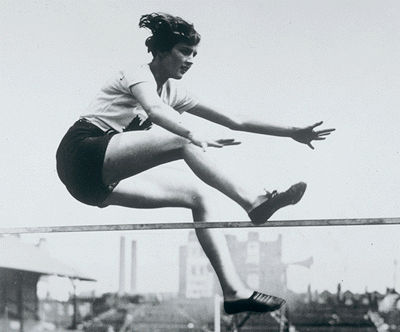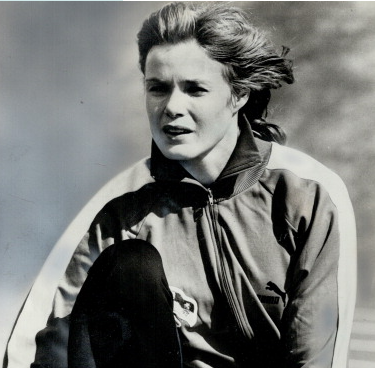
Canada's
Hilda Strike celebrates her silver medal win in the women's 100m race at the
1932 Olympic Summer Games in Los Angeles.
Hilda Strike
Hilda Strike, (born at Montréal, 1 Sep 1910; died at Ottawa, 9 Mar 1989). Hilda Strike was an athlete in the 1932 SUMMER OLYMPICS in TRACK AND FIELD.
Montrealer Hilda Strike began track and field in 1929. Passionate about exercise, she practised skating, swimming, softball and indoor sports such as badminton, basketball and volleyball. She was recruited by Canadian athlete Myrtle COOK, a gold medallist at the 1928 Amsterdam Olympics, who after seeing her speed in running after goals at a softball match, suggested that Strike join the Canadian Ladies' Athletic Club of Montreal to train in track and field.
In February 1930, Hilda Strike took part in a track and field meet at the Coliseum in Toronto. In company with Myrtle Cook, Louise Jeffreys, and Lillian May, she was part of the first Québec women's team in a domestic Canadian track and field championship.
Little by little, Hilda Strike made her mark in the 100 metres. Masterfully guided by Cook, she collected some thirty medals in various competitions in Canada and the United States from 1929 to 1932.
In July 1932, Strike participated in the Canadian track and field championships in Hamilton. For the first time in Canadian history, all provinces sent female delegates to this event whose results would determine the composition of the national Olympic team in Los Angeles. Strike qualified easily.

Canada's
Hilda Strike participates in the women's athletics event at the 1932 Olympic
Summer Games in Los Angeles.
At the Los Angeles Games, she took part in the 100 metre and the 4 x 100 metre competitions. On August 2, in the 100 metre finals, she made a lightning start leaving her adversaries behind until half way through the course. Then, Stella Walsh, a Polish resident of the United States, gradually caught up. In a race where the two first competitors shattered the world record, Walsh took the better of the Canadian, arriving ahead of her by barely a few centimetres.

Canada's
Hilda Strike (centre) celebrates her silver medal win in the women's 100m event
at the 1932 Los Angeles Olympics.
On August 7, the 4 x 100 metre relay gave Strike a second chance at gold. At the start of the race, Canadians Mildred Frizzel and Lilian Palmer provided their team with a head start. Then, Mary Frizzel, the third competitor in the relay lost ground. The handover to Strike took place with difficulty and slowed down the team. However, Hilda managed to decrease the distance and crossed the finish line a fraction of a second after Germany who set a record time of 46.9 seconds. For Hilda Strike, it proved a second silver medal.
In December 1932, the double Los Angeles medal winner became the first woman selected for the Norton H. Crowe Memorial. Although sports journalists chose Alex Wilson for this trophy, Hilda Strike's outstanding performances merited the title of best female athlete of the year in Canada, and most popular athlete in Montréal.
Passionate about her sport, Strike founded the Mercury Athletic Club in Montréal in 1933 with her friend Myrtle Cook-McGowan. Strike was a coach and also competed under the club's colours.
The next year, she took part in her final major international meet in London at the Empire Games, later the COMMONWEALTH GAMES. Hilda Strike collected two silver medals: the first in the 100 yards with a very fast time of 11.5 seconds; the second in a 110-220-110 yard relay. After this, she retired from competition.
In 1964, she was inducted into the Canadian Olympic Hall of Fame, and eight years later into Canada's Sports Hall of Fame.
Hilda Strike's achievements resurfaced in the early 1980s at the death of her major rival Stella Walsh. Since Walsh died following a burglary in Cleveland, Ohio, an autopsy was performed, and the American proved to be a hermaphrodite, with both masculine and feminine characteristics.
A few years later, in 1984, Hilda Strike claimed the medal won by Walsh in the 1932 Olympic Games, but unfortunately, since sex verification tests were not carried until the 1968 Olympics in Mexico, her request went unheeded.
Hilda Strike, the fastest woman in the world in1932, died on 9 Mar 1989 in Ottawa.

 Share on Facebook
Share on Facebook Share on X
Share on X Share by Email
Share by Email Share on Google Classroom
Share on Google Classroom


